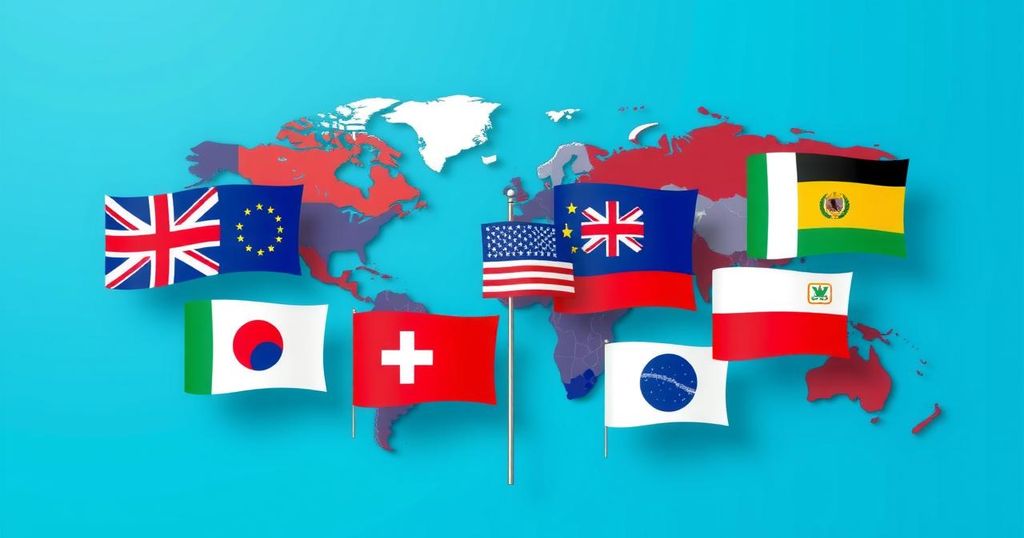Challenges Faced by Ghana in Renegotiating IMF Deal
Ghana’s attempt to renegotiate its $3 billion IMF deal failed due to strict fiscal discipline and debt sustainability concerns raised by the IMF. The nation sought flexibility in its agreements amidst public discontent but faced resistance due to the IMF’s irreducible debt sustainability framework. Specialized legal expertise could assist Ghana in meeting its obligations while optimizing restructuring negotiations.
Ghana’s recent negotiations with the International Monetary Fund (IMF) to revise the terms of its $3 billion Extended Credit Facility (ECF) have encountered significant challenges. The IMF’s refusal to accommodate Ghana’s requests highlights the complexities of maintaining fiscal discipline and ensuring debt sustainability, further emphasizing the necessity for specialized legal expertise in high-stakes financial discussions.
The $3 billion ECF, initiated in 2023, was designed to restore macroeconomic stability after Ghana defaulted on external debt in December 2022. The agreement mandated strict fiscal measures, including reductions in government spending, improvements in domestic revenue generation, and stringent controls on borrowing and expenditure. These conditions represented formidable obligations for the country.
In light of public discontent and economic difficulties, Ghana sought to amend these targets, aiming to reduce unpopular austerity measures, ease tax burdens, and enhance expenditure in infrastructure and agriculture. However, these proposed adjustments were met with resistance from the IMF, which feared that loosening fiscal goals could jeopardize Ghana’s debt sustainability.
The IMF maintains a rigorous, rules-based debt sustainability framework that does not permit flexibility for countries that fail to meet established targets. The organization believes that bending these rules for Ghana may set a dangerous precedent for other nations in similar circumstances. Ghana’s slow pace in restructuring its external debt has further contributed to the IMF’s reluctance to authorize amendments.
Ghana could reconsider its approach to renegotiation by presenting a fiscal strategy that reduces deficits without politically sensitive tax increases. Strengthening anti-corruption measures may also enhance IMF confidence in the nation’s financial governance. Phased implementation of targets, rather than outright reductions, could foster more effective negotiations.
As part of the IMF program, Ghana is required to establish significant restructuring agreements with bilateral and private creditors and adhere to specific debt sustainability benchmarks. These include maintaining external debt service below 18% of GDP and executing a Domestic Debt Exchange Program (DDEP) to lessen debt obligations.
Ghana’s desire to relax these sustainability mandates stems from a need for greater flexibility in obtaining new concessional loans for infrastructure needs. The nation also sought to negotiate a longer repayment period with bondholders to alleviate short-term liquidity challenges. However, the IMF opposes any terms that could increase short-term liquidity at the expense of long-term fiscal stability.
Ghana’s obligations include securing a comprehensive debt restructuring plan with both bilateral creditors and private bondholders, while ensuring that all creditors receive equal treatment. The IMF adheres strictly to its Common Framework for Debt Treatments, which necessitates uniformity in creditor agreements.
For a successful renegotiation, Ghana may benefit from utilizing legal experts in debt negotiations to create a dual-track restructuring approach. This would involve maintaining IMF commitments while facilitating separate, flexible arrangements with bilateral creditors, particularly China. Establishing a legal framework for creditor engagement could streamline decision-making processes among bondholders.
The incorporation of international legal expertise is crucial in sovereign debt restructuring. Legal professionals can navigate IMF contracts and propose frameworks that align with both IMF stipulations and Ghana’s economic imperatives. Furthermore, experienced negotiators are essential to mediate among diverse creditor groups while ensuring compliance with IMF requirements, thus avoiding pitfalls seen in cases like Argentina’s past litigations due to poor restructuring agreements.
Ultimately, Ghana’s failure to renegotiate its IMF deal illustrates not only an economic predicament but a critical legal challenge. Strengthening its negotiation team with legal experts is imperative for developing innovative debt restructuring proposals, effectively coordinating creditors, and mitigating legal risks associated with restructuring. A robust legal strategy could significantly enhance Ghana’s prospects for successful negotiations and long-term economic recovery.
In conclusion, Ghana’s inability to renegotiate its terms with the IMF underscores the intricate interplay between fiscal discipline, legal frameworks, and creditor relationships. The urgency for specialized legal expertise is paramount, as it can facilitate smoother negotiations and help Ghana navigate the complexities of sovereign debt restructuring. By adopting a more strategic approach to its financial negotiations, Ghana may enhance its chances for economic recovery and stability.
Original Source: www.myjoyonline.com




Post Comment